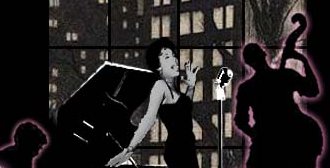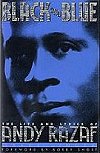Welcome toCafe SongbookInternet Home of the |
 |
 |
| Home || Songs || Songwriters || Performers || Articles and Blogs || Glossary || About Cafe Songbook || Contact/Submit Comment | |
| Search Tips: 1) Click "Find on This Page" button to activate page search box. 2) When searching for a name (e.g. a songwriter), enter last name only. 3) When searching for a song title on the catalog page, omit an initial "The" or "A". 4) more search tips. | |
Ain't Misbehavin' |
|||
Written: 1929 |
Music by: Thomas Fats Waller |
Words by: Andy Razaf |
Written for: Hot Feet/Connie's Hot Chocolates (revue) |
| Page Menu | |||
| Main Stage || Record/Video Cabinet || Reading Room || Posted Comments || Credits | |||
|
||||||
Cafe Songbook Reading Room"Ain't Misbehavin'" |
||||
More Sources: See Critics Corner (below).
|
About the revue Hot Feet/Connie's Hot ChocolatesHot Feet/Connie's Hot Chocolates: Hot Feet was an all black revue that opened in Harlem at Connie's Inn in 1929 and was popular enough to move to Broadway's Hudson Theater later that year, where it was renamed Connie's Hot Chocolates. Louis Armstrong made his New York debut playing a distinctive trumpet in the Orchestra. Between acts the young Armstrong rendered "Ain't Misbehavin'" so distinctively that he was given another chorus to perform after Margaret Simms and Paul Bass introduced the number as a love duet during the first act. The show was also a springboard to fame for Cab Calloway who replaced Bass later in the show's run. (originally from WICN radio, web page, no longer available). Hot Feet opened at Connie's Inn on February 28, 1929. Barry Singer, Razaf's biographer, quotes a review of the show from the Pittsburgh Courier as saying, "This is the first floor show of New York's exclusive night clubs to entirely the work of men of color" (Singer, p. 205) |
|||
| Critics Corner | ||||
 Maurice Waller and Anthony Calabrese. Fats Waller. New York: Schirmer Books, 1977 |
Many accounts of how"Ain't Misbehavin'" was conceived have been floated. The "true story" according to Maurice Waller, Fats' son, is less exotic than most of the others.
|
|||
|
As for the more exotic versions of the story, Andy Razaf's biographer, Barry Singer lets us know, Waller was inclined, "in later years" to call 'Ain't Misbehavin' "The Alimony Jail Song." He claimed to have written it while in alimony jail. Needing $250 dollars to get out, he he managed to get a "miniature piano" delivered to his cell and within two days had written the song, which his lawyer sold to a publisher to raise the necessary funds to spring him. Singer also presents Razaf's recollection of how the song was written: During rehearsals for the Broadway review Connie's Hot Chocolates, Razaf showed up at Waller's apartment on 133rd street in Harlem. Waller was in his pajamas at the piano playing "a marvelous strain, which was complicated in the middle. I straightened it out with the 'no one to talk with, all by myself' phrase . . . which led to the phrase 'ain't misbehavin,' which I knew was the title. The whole thing took about forty-five minutes." The two of them then went to their publisher's office where they sold the song and then to the theater where it was arranged by Harry Brooks for the show (Singer, Black and Blue, 212-14). |
|||
 Ken Bloom, The American Songbook, The Singers, The Songwriters and the Songs. New York: Black Dog and Leventhal Publishers, 2005 |
Ken Bloom quotes Harry Brooks, who generally receives co-credit for the music, as presenting yet another aspect of how "Ain't Misbehavin" was written. The composition was, according to Brooks, "an attempt to copy the successful formula Gershwin used for 'The Man I Love.' We imitated the opening phrase that began just after the first beat and the minor part of the bridge, too."
|
|||
|
Alec Wilder, whose book American Popular Song is a classic, comments on Harry Brooks claim that he and Waller consciously imitated Gershwin's "The Man I Love" (See just above). Wilder writes, "There is a tale that the composers of this song deliberately set out to fashion a new melody on the harmony of another famous one. It's of no matter, as they found a good rhythm ballad" (Wilder, American Popular Song, p. 467). Thomas Hischak calls "Ain't Misbehavin'" a "timeless jazz lament of a faithful lover who stays at home listening to the radio and is 'savin' my love for you' even though the lusty music and the sly tone of voice make one question the sincerity of the statement," and he adds, "one of the song's distinctive qualities is its contagious use of changing harmonies." (Hischak, The Tin Pan Alley Song Encyclopedia
|
|||
|
William Zinsser elaborates on Wilder's point when he writes, "African-Americans have been credited with writing so few popular standards that anyone might think they were writing a different kind of music. But the music composed by American blacks in the early years of the 20th century is one of the cornerstones of American popular song. Theirs was the jazz and ragtime sensibility that George Gershwin, Harold ARlen and many other white song-writers went to Harlem to draw inspiration from." Commenting on the collaboration between Razaf and Waller, Zinsser notes that the "endlessly fertile" Waller was someone out of whom "tumbled songs of high exuberance as fast as his hands touched the keys ('Squeeze Me,' 'The Joint is Jumpin'). He could match Razaf's playful side ('Honeysuckle Rose') and also his serious concerns, as in the poignant race song 'Black and Blue' ('What did I do to be so black and blue?')" (Zinsser. Easy to Remember, pp. 71, 74). |
|||
| Lyrics Lounge | ||||
Click here to read Cafe Songbook lyrics policy. |
||||
| back to top of page | ||||
Visitor CommentsSubmit comments on songs, songwriters, performers, etc.
Feel free to suggest an addition or correction. Please read our Comments Guidelines before making a submission. (Posting of comments is subject to the guidelines. Not all comments will be posted.) |
| To submit a comment, click here. |
Posted Comments on "Ain't Misbehavin'":
No Comments as yet posted |
| back to top of page |
Credits(this page) |
Credits for Videomakers of custom videos used on this page:
Borrowed material (text): The sources of all quoted and paraphrased text are cited. Such content is used under the rules of fair use to further the educational objectives of CafeSongbook.com. CafeSongbook.com makes no claims to rights of any kind in this content or the sources from which it comes.
Borrowed material (images): Images of CD, DVD, book and similar product covers are used courtesy of either Amazon.com
Any other images that appear on CafeSongbook.com pages are either in the public domain or appear through the specific permission of their owners. Such permission will be acknowledged in this space on the page where the image is used.
For further information on Cafe Songbook policies with regard to the above matters, see our "About Cafe Songbook" page (link at top and bottom of every page). |
The Cafe Songbook |
||
Performer/Recording Index
(*indicates accompanying music-video)
|
||
1929
Notes: This album contains two versions of Ain't Misbehavin'," one from 1929 (the year the song was written) to as late as late 1955. Personel on the 1929 version heard on the music-video below: Drums - Arthur "Zutty" Singleton; Piano - Gene Anderson; Alto Sax - Bert Curry and Crawford Wetherington; Violin - Carroll Dickerson; Saxophone [Tenor] - Jimmy Strong; Trombone - Fred Robinson; Trumpet - Homer Hobson and Louis Armstrong; Vocal - Louis Armstrong. |
||
1939/1943
Video: Waller performing his song in the 1943 movie Stormy Weather with Lena Horne, dancer Bill "Bojangles" Robinson, drummer Zutty Singleton, bassist Slam Stewart, and trumpeter Benny Carter. Waller died at thirty-nine within months of completing the movie.)
|
||
| back to top of page | ||
1944
(Please complete or pause one video before starting another.) |
||
| back to top of page | ||
1950
Notes: "She recorded eight selections [from the album] in 1950 with an octet that included trumpeter Miles Davis, trombonist Benny Green, the remarkably cool clarinetist Tony Scott and tenorman Budd Johnson. This CD adds alternate takes to seven of the numbers, increasing the discography of both Sassy and Miles. This version of "Ain't Misbehavin'" is a true classic (with memorable eight-bar solos by each of the four horns)." -- from the iTunes album review. |
||
1953
Notes: "The Best of the Pablo Solo Masterpieces collects 20 tracks from the original seven-disc box set of recordings made by influential jazz pianist Art Tatum between 1953 and 1956. Featuring Tatum alone at the piano, producer Norman Granz intended these sessions as a spotlight for the artist, and as such, they deliver a portrait of the genius technician in the latter stage of his career. Although Tatum's brilliant early work is the place to start listening to his unique style, the Pablo sessions are nonetheless essential listening for Tatum fanatics. Also, given the exhaustive nature of the original 120-track box set, this compilation is a welcome development." ~ Matt Collar at CDUniverse.com.
(Please complete or pause one |
||
| back to top of page | ||
c. 1955
Notes: "This collection covers [McRae's] work in the mid-'50s for Decca both with small groups and larger orchestras. . . . Each of the 16 tracks here is like a primer on how to be a vocalist, jazz or otherwise. McRae's entry in Verve's Diva Series is a fine introduction to her 1950s recordings." --from iTunes album review. |
||
1956
Notes: "This is one of her better recordings. She is backed by some of the great names of jazz including Charlie Shavers, Buster Bailey, and Dick Hyman to name a few." from Amazon reviewer, Hap. |
||
| back to top of page | ||
1957
|
||
1960
Notes: "Although associated with the more modern styles of jazz, Brubeck always had a great respect (if not reverence) for the masters of the past. On ten standards Brubeck, altoist Paul Desmond and the Quartet fit in perfectly behind the great swing/blues singer Jimmy Rushing who sounds rejuvenated by the fresh setting. This disc, a surprising success, is well worth searching for." -- iTunes review |
||
| back to top of page | ||
1963
Notes: "Surprisingly enough this 1963 LP was the first time (other than a couple songs) that Ella Fitzgerald and Count Basie recorded together. (The match-up was so logical that it would be repeated many times over the next 20 years. ) Fitzgerald sounds fine and, even if Quincy Jones' arrangements did not give the Basie musicians as much space for solos -- although two songs do feature a bit of trumpeter Joe Newman, trombonist Urbie Green and Frank Foster on tenor -- this is an enjoyable effort. High points include 'Honeysuckle Rose,' 'Them There Eyes' and 'Shiny Stockings.' ~ Scott Yanow at CD Universe.com. |
||
| 1976 Floyd Pepper and Electric Mayhem (as Muppets) perform "Ain't Misbehavin'" on The Muppet Show. Season 01, ep 02., Jan. 1976. (Please complete or pause one video before starting another.) |
||
| back to top of page | ||
1988
Notes: Strange as it seems, pianist Dick Hyman was not present at the recording session that resulted in this CD. Months earlier, Hyman performed 15 Fats Waller songs on the Bosendorfer 2905E reproducing piano in New York. A computer floppy disc of the date was sent to California where it was recorded direct to CD. But more important than the technology involved is the music itself. Sometimes Hyman seems to take these pieces a little too seriously, treating "African Ripples" and "Viper's Drag" as if they were classical music but, to his credit, his treatment of the Waller compositions (mixing in the familiar with obscurities such as an enthusiastic "I'm Goin' To See My Ma" and a very complex version of "Bach Up To Me") does not attempt to copy Fats' style. A surprisingly uptempo version of "Stealin' Apples" and a thoughtful rendition of "Ain't Misbehavin'" are among the highpoints. Recommended. ~ Scott Yanow at CDUniverse.com.
(Please complete or pause one |
||
2008
(Please complete or pause one |
||
| back to top of page | ||
2008
Notes:
|
||
2009
Notes: "2009 release from the Country/Pop icon. American Classic is Willie Nelson's return to the Great American Songbook, a crossover standards album by the man who invented the genre with his landmark, best-selling 1978 album Stardust, which has been certified five-times Platinum by the RIAA. Produced by Tommy LiPuma and featuring guest duet partners Norah Jones on the classic tale of seduction 'Baby It's Cold Outside' and Diana Krall on 'If I Had You.' " from Amazon Editorial Review |
||
| back to top of page |
| Home || Songs || Songwriters || Performers || Articles and Blogs || Glossary || About Cafe Songbook || Contact/Submit Comment | |
© 2009-2018 by CafeSongbook.com -- All Rights Reserved |









